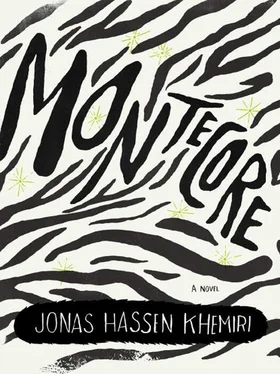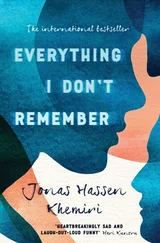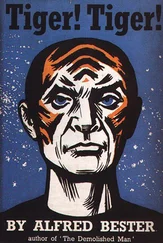My premiere rendezvous with your father was installed in the end of 1962. In many ways the morning was ordinary. I lay, wakened early, on my mattress as Sofiane mooed his snores and Omar released flatulence. I heard Cherifa’s morning body as it shuffled its steps toward the garden to gush the water pump. And then suddenly … in between two hoarse-throated rooster melodies … a knock at the door. First faint and fluttery. Then stronger.
Cherifa went toward the door, mumbling; I levitated myself and followed her steps. The door was turned out toward the sunlight of the dawn and on the outside stood …
Your father.
Here his age was that of a small twelve-year-old, his arms twiggily thin and his black hair a burred outgrowth. His shirt bore reddish traces of vomit and his body vibrated in the sunlight. Cherifa interpellated him his errand. Your father separated his dry lips and gesticulated his arms like a desperate bird. He hacked his throat and rattled up hoarse sounds. But no words were pronounced. I remember how he himself looked very disbeliefed at his muteness.
The limit for Cherifa’s sympathy was more than reached. The house was topped and she had guaranteed Faizal that NO more martyr children would be saved at his expense. But how could she act? Should she return this poor mute being to the street? While she contemplated her decision your father presented her a well-folded envelope. She gaped its contents and quickly aired her lungs as when the water in the shower suddenly becomes ice-cold. She immediately conducted your father into the cool shadow of the hall. What did your father delegate to Cherifa? My guess is an explaining letter. Or a generous sum of finances.
While Cherifa looked to the envelope’s contents as though to guarantee that she had not misestimated the substance, your father’s eyes mirrored mine. I erected my safe hand against his spongy one, and calmed his nervous eyes with a sparkling white welcome smile.
“My name is Kadir,” I auctioned. “Welcome to your new home!”
“…,” responded your father.
“Um … what?”
“…”
Your father regarded me with questioning eyes. It was as though black magic had blocked his speech. In reality, it was a natural shock consequence of a nightly explosion, a mother’s death, a confused flee, and the emotion of being the absolute solitariest in the world. I patted your father’s shoulder and whispered:
“Don’t worry, you are at home here.”
In the book, this scene must be filled with great dramatic gunpowder and symphonic bass tubas.
Write:
“So here they are. My father and Kadir. The hero and his escort. Kadir, who will follow my father’s fate forever, kind of like how Robin follows Batman or the Negro in Lethal Weapon follows Mel Gibson. They are two newly found best friends who will never break each other’s promises.”
[Maybe you can then form two soaring birds out in the dawning sky who meet and smile their beaks at each other and then sail away toward Kroumirie Mountain. (That would be like a symbol of our initiated friendship.)]
Your father and I quickly knotted our band of friendship into a beautiful, wordless rosette. Already on the first day we parked our bodies on the same double bench when Faizal performed lessons. At lunch I showed how one hid one’s sweets under one’s shirt so as not to attract the older boys’ jealousy. During siesta I uttered many questions about his origin, which he tried to answer, but … his tongue still did not work. He waved his arms. He exposed me to a black-and-white photo depicting a suited man being suppered with two Europeans. He let me hold a gnarled chestnut. But not one word was pronounced by his lips. For that reason he was soon nicknamed ironically with the Arabic equivalent of “the one who talks as much as one who has swallowed a radio.”
Your father’s muteness grew Cherifa’s sympathy. He became her new favorite and he assisted her often with domestic assignments. She tried to cure his muteness by constantly conversing him. She discussed heaven and earth, weather and wind, village rumors and relations, scandalous pepper prices, and erotic neighbor visits.
Jealous of the active attention that your father got from Cherifa, Faizal began to plow his palms with hard, punishing blows of the cane. He anticipated moans from your father, but all that happened was that your father’s palms reddened, bled, and were scarred into stable scabs. Your father’s muteness was intact. (Incidentally, isn’t it bizarre that your father’s speech problem was later inheritaged by you? For you must remember what problems you had expressing simple letters like r and s in your childhood?)
Let the date now leave the spring for the fall before the next winter. Let the frost enshroud the yard, let the crickets become silent. Your father and I played wordless games, partook sunflower seeds, spied on the water-fetching girls of the district. We developed an advanced sign language that only we understood.
Your father’s nights were still perspiring wakes, memories of a mother’s screams, sparks and fiery roars and nightly crossed borders. Frequently the tears welled his eyes with mental pictures that always bore the character of indistinctness. I tried to comfort his tears but only certain sorrows are comfortable. Others are not. This is the tragic fact of life.
Here I propose that you inject some of your own memories from your yearly vacations in Tunisia. If you fear needing to compete with my metaphoric magnificence you can vary your font. Do you memorize anything from Jendouba?
Sure you remember Jendouba …
The city in western Tunisia where Dads grew up. The city where wrinkly, straw-hatted farmers sit crookedly on horseback and red trailers rattle iron bars. You remember the hectic souk, hajjis who bite together their white veils with their teeth, the movie theater where they showed Chinese kung fu films with German subtitles.
You remember the pounding at the hamam, the eternal rubbing out of sweat dirt, Dads’s hairy bodies, and then go home on the truck bed with cactuses whizzing by and stacked mountains of garlic.
But your strongest memory is Grandma Cherifa, who was so fat she always went sideways through the doors. Cherifa, who welcomed you with a pat and called you felouse and always pinched your spare tire to check your subcutaneous fat and always scolded Dads because you were practically starved to death from all the strange Swedish food. And you remember Grandpa Faizal, the retired village teacher with a doctor’s bag who always defended Jendouba and maintained that the city actually has a lot in common with New York. Both cities are quite near rivers, for example. Both cities are run by idiots. Both cities have yellow taxis. Both cities have big garbage problems. And both cities are hard to get lost in — New York has its grid system and we have our brilliant alphabet system — and then Faizal smiles so his white mustache becomes an extra smile on top, because he certainly doesn’t need to explain whose cousin it was that thought up Jendouba’s street system …
And both cities have also earned a long list of nicknames. New York has “the Big Apple,” “the Melting Pot,” “the World’s Capital,” “the City That Never Sleeps.” Jendouba has “the Asshole,” “the Armpit,” “the Sauna,” “the Colon,” “the Donkey’s Ass,” “the Grill,” “the Fireplace,” “the Oven,” or maybe Dads’s ironic “the Freezer.” And it’s only when Dads want to be a little extra academic that he says that you will be spending the summer in “Anus Rectum.”
And you remember all of Dads’s friends. The journeys home from the airport in Omar’s 1960s Mercedes with taped hubcaps, the welcome-home couscous with Olfa’s family, Amine’s roaring greetings, Zmorda’s warm lap. Everyone’s sighs when Nader starts to brag, as usual, about that tailor who believe it or not sews pants with legs of different lengths at no extra cost. And you remember so incredibly much more, the tattoos on Sofiane’s gigantic biceps, Dhib’s left arm that’s always extra brown from all the sunny hours in the taxi, the nights sleeping on the roof, and the smell of just-washed sheets, hookahs with apple flavoring, and just-baked cookies from Emir’s factory. Twilight on the medians of the downtown streets, where you sit with Grandma and break off pieces of watermelon with a splitting sound, spitting seeds at passing cars, waving at Dhib’s taxi, enticing him with the pulp while the light pink watermelon juice runs slowly down your forearm. But the question is, does any of this belong in the book about your father? Presumably not. Presumably it’s better to let Kadir steer in the beginning … because of course you remember Kadir, too. Dads’s best friend. The woman-hungry compliment sprinkler in a violet suit who visited your family in Sweden in the middle of the eighties and left in a fury for reasons you don’t remember. What was it that really happened?
Читать дальше










